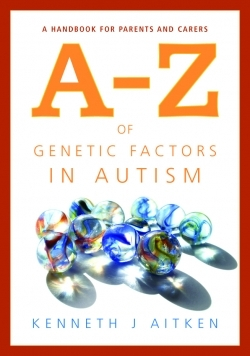A-Z of Genetic Factors in Autism
Autism is no longer simply autism. With our ever-growing understanding of the condition, the idea of one single disorder has been replaced by the concept of Autism Spectrum Disorders (ASDs). While this has allowed doctors and scientists to develop a much more subtle and shaded understanding of the conditions that make up ASDs, it has also made understanding autism that much more difficult for the layperson.
Of course, it is not only scientists and doctors who need access to the most thorough understanding of ASDs possible. Kenneth J. Aitken, a practicing clinical psychologist, attempts to meet the needs of the rest of us with his book, The A-Z of Genetic Factors in Autism. Based in the UK, the author is active in many organizations and initiatives with the common goal of building a better understanding of ASD. This is his third book on autism.
Aitken aims to provide a summary of the multifarious genetic conditions that could fall under the umbrella of autism. Some of the disorders, like Down syndrome, are well known. Others, like adenylosuccinate lyase (ASDL) deficiency, are rare or poorly understood. Entries on each condition vary in length accordingly. For each, Aitken provides a breakdown of the most pertinent information, such as how common the disorder is, evidence for the disorder’s association with ASD, main clinical features of a disorder, treatment and management, and further information and support.
Importantly, Aitken never claims to have all the answers. Many modern medical books are written by doctors who seem certain they’ve “solved” medical problems with one handy book. Aitken, on the other hand, freely acknowledges that the information in his book will soon be outdated, and offers the reader directions to the same medical literature he used (there are sixty-three pages of citations in the back). Furthermore, he provides contact information for numerous support organizations, so that readers can continue to find the information and assistance they need.
The entire volume is laid out with an excellent mix of scientific meticulousness and user-friendly introductions, appendices, and glossaries. Aitken has provided something of a template for modern medical books. This book is recommended for anybody who may have to deal with ASDs in their life, such as teachers, parents, or even those diagnosed themselves. It doesn’t gloss over any of the complexity, instead helping the reader to work through the complexities themselves, and in this way it is tremendously empowering.
Reviewed by
Kenrick Vezina
Disclosure: This article is not an endorsement, but a review. The publisher of this book provided free copies of the book and paid a small fee to have their book reviewed by a professional reviewer. Foreword Reviews and Clarion Reviews make no guarantee that the publisher will receive a positive review. Foreword Magazine, Inc. is disclosing this in accordance with the Federal Trade Commission’s 16 CFR, Part 255.

